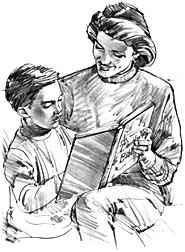The Subliminal Messages of Sexual Imagery on Our Children
What is a parent to do about all of the negative imagery splashed around in society? It’s almost impossible to go anywhere without having some form of immorality shoved into our face. Negative immoral garbage is everywhere! It’s scary when you think about how after a while of your children seeing the same sexual innuendos over and over it begins to form a part of their thoughts and beliefs. And that is where the problem begins.

Think about what negative immoral images have been ingrained into your child’s mind? Can negative images make them think negatively about themselves? Yes! Young girls have been taught from society that what is seen on the outside is basically the only thing that matters and that being only half dressed is appealing and that if you want to be “something” you need to look a certain way, dress a certain way and behave a certain way. How can a parent counter such an alluring suggestion from the world? Simple, don’t be that way yourself. Teach principles by God’s standards and not worldly standards.
And this is where the teenage boy comes into the picture. He is only seeing what is on the outside of females and finds it difficult to understand, respect and value what is on the inside. Even church leaders have gotten themselves ensnared within the sexual lusts of society? What kind of a picture does that tell your children? What is going on when so-called men of God can’t keep spiritually fit? It is a vicious cycle that you should not even be a part of.
The Subliminal Messages of Sexual Imagery on Our Children Read More »









 to survive in a home devoid of healthy parental love, limits, and consistency, they must develop “survival skills” very early in life. In a chaotic, dysfunctional family, the lack of external control through consistent loving disciple results in an inability to develop internal discipline and self control. They learn not to depend on their parents to meet their needs – instead, it is all up to themselves. And, because they can’t trust their own parents, they become generally suspicious and mistrustful of all human beings. Yet, they are defenseless against the projection of blame and often feel responsible for parents’ addiction. They become “little adults” that feel compelled to accept responsibilities well beyond their years.
to survive in a home devoid of healthy parental love, limits, and consistency, they must develop “survival skills” very early in life. In a chaotic, dysfunctional family, the lack of external control through consistent loving disciple results in an inability to develop internal discipline and self control. They learn not to depend on their parents to meet their needs – instead, it is all up to themselves. And, because they can’t trust their own parents, they become generally suspicious and mistrustful of all human beings. Yet, they are defenseless against the projection of blame and often feel responsible for parents’ addiction. They become “little adults” that feel compelled to accept responsibilities well beyond their years.